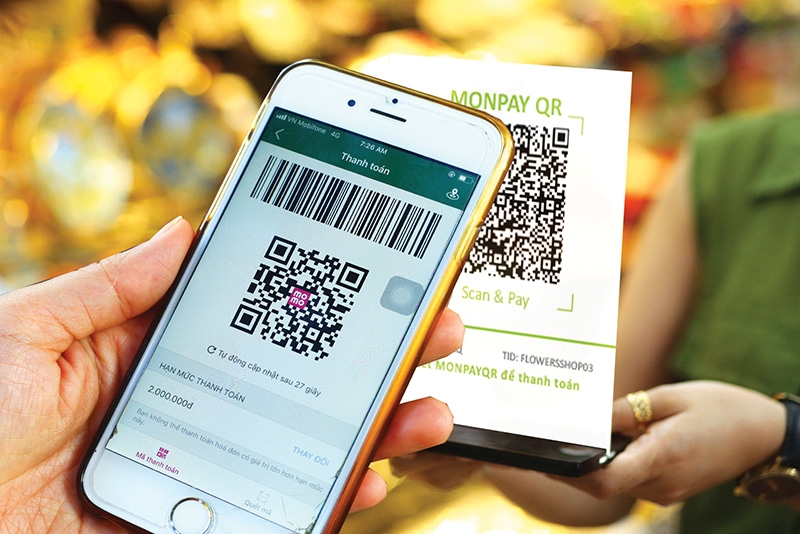 |
| Visa, Mastercard, Alipay, and others may elbow their way into the mobile money game. Photo: Le Toan |
Promoting non-cash payments is a priority task for the Vietnamese government, with the ambition that cashless transactions exceed one-third of all transactions nationwide in the coming months.
Nguyen Manh Hung, Minister of Information and Communications, has confirmed that mobile money will officially be deployed on a national scale from next month.
As such, Vietnam’s vast tech-affine, young population and nearly 100-per-cent mobile subscription rate would help a string of companies, including foreigners, to rack up users as well as revenue in the market.
“With the State Bank of Vietnam (SBV) not imposing a foreign investment cap and with an already booming ecosystem of fintechs in Vietnam, the potential for foreign telecom operators and investors to provide mobile money services is immense,” Riddhi Dutta, regional director of fintech Backbase in Asia told VIR.
Under Article 3.13 of the draft amendments to Decree No.101/2012/ND-CP issued in 2012 on non-cash payments, mobile money means electronic money issued by an intermediary payment service provider providing telecommunications services and identifying customers through a mobile subscriber database.
The draft decree put an explicit threshold of 49 per cent on foreign ownership in intermediary payment service providers. This aims to attract foreign funds but also ensure the active participation of Vietnamese enterprises. However, after due review, the SBV has decided to scrap this suggestion as it believes that foreign investment has played a key role in the formation of the domestic payments landscape since providers heavily rely on technology.
According to Dutta, limiting foreign ownership would hamper foreign investment in the e-payment sector and fintech in general.
Winnie Wong, country manager of Mastercard in Vietnam, told VIR that the firm is now co-operating with relevant parties, including banks, to offer advanced payment solutions that seamlessly process and protect billions of transactions.
“We are looking forward to working with mobile money partners in Vietnam to provide safe and secure payment transactions for customers,” she emphasised.
This is not the first time Mastercard expresses its keen interest in mobile money services. A few months ago, Mastercard partnered up with Airtel Africa, a telecommunications and mobile money services provider, to allow its mobile money users to use a virtual Mastercard and QR codes to make payments.
Visa, the world’s leader in digital payments, also struck up a partnership with some African firms to give more customers access to virtual Visa cards for digital payments or remittance transactions.
Currently, Visa is putting its best efforts into bringing cutting-edge payment technologies to the Vietnamese market and is highly likely to roll out mobile money-related services.
In addition, Alipay, a smartphone-based payment system backed by Ant Financial from Alibaba Group, has more than one billion active users. The firm hopes to increase customer base to two billion worldwide by 2025.
In Asia, Ant Financial has been investing in local mobile payment services in India, Indonesia, Malaysia, the Philippines, Singapore, South Korea, and Pakistan. The Economist reported that the corporation invested $184.5 million to acquire 45 per cent of Telenor Microfinance Bank (TMB), which manages Pakistan’s biggest mobile money service, Easypaisa.
Alipay could also be making inroads into the market. Last December, Ant Financial quietly acquired a sizeable stake in Vietnamese e-wallet eMonkey, while Lazada Vietnam (also backed by Alibaba) incorporated eMonkey into its platform. However, it is still too soon to say if these foreign giants would jump onto the mobile money bandwagon.
Dutta of Backbase pointed out vast potential for foreign companies to capitalise. Specifically, unlike mobile wallets like Momo, Zalopay, or ViettelPay, which require users to transfer money from a bank account to their wallet, mobile money users only need a mobile account to carry out small payments.
Given Vietnam’s high mobile penetration rate and large unbanked population, mobile money could bring basic financial services to those living in remote areas.
State-owned VNPT and military-run Viettel have been licensed by the SBV to implement mobile money services, while MobiFone is waiting for the approval. A national database has also been built for issuing personal identification numbers, as well as adopting e-KYC (electronic Know-Your-Customer).
Nguyen Son Hai, deputy general director of VNPT, noted that Vietnam has immense potential in terms of mobile money deployment as mobile phone subscriber density has reached 100 per cent of the population.
“It only takes one month for us to roll out the service in the market after getting the license. VNPT will launch the service at our 100,000 selling points nationwide, promoting cashless payment as subscribers are increasingly turning to e-commerce,” said Hai.
Mobile money will reach new heights if local authorities approve small-sized financial transactions to purchase goods and services.
Nguyen Thanh Nam, Viettel Group’s deputy general director, unveiled that the group has been in full throttle to launch the new service right after receiving the licence.
Accordingly, Viettel has developed the necessary infrastructure for service provision from rural to urban areas, with more than 50,000 points of sales and 200,000 transaction points nationwide. VIR
Van Huong

Vietnam gov't greenlights Mobile Money
The regulation on mobile payment will not allow users to recharge from scratch cards but they must conduct deposits and withdrawals from the registered bank account.

Vietnam to launch mobile money in June
Mobile money is about to be launched in Vietnam despite worries about management methods.
 As Vietnam heads towards a cashless economy and mobile technology is becoming ubiquitous, the adoption of mobile money next month is predicted to lure local and foreign firms into joining the game.
As Vietnam heads towards a cashless economy and mobile technology is becoming ubiquitous, the adoption of mobile money next month is predicted to lure local and foreign firms into joining the game.